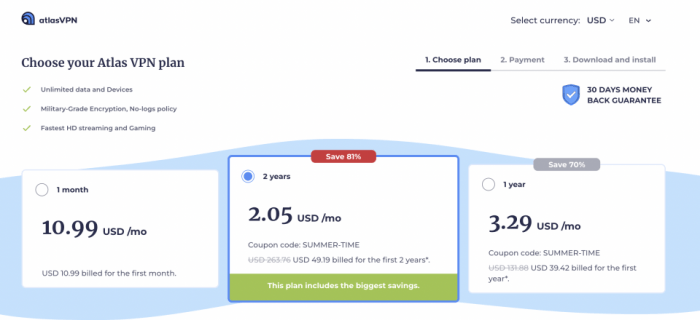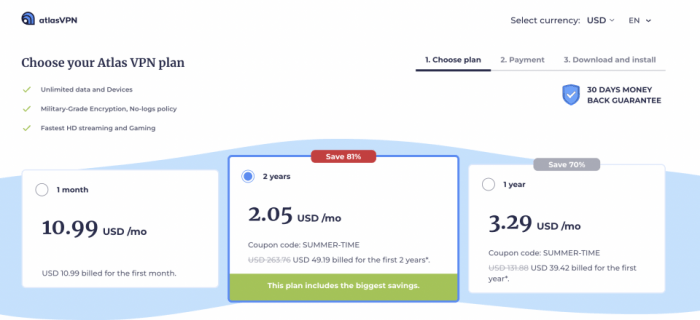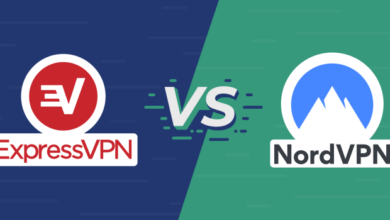
ProtonVPN vs Atlas VPN: Which is Right for You?
ProtonVPN vs Atlas VPN: Choosing the right VPN can be a tough decision, especially with so many options available. Both ProtonVPN and Atlas VPN are popular choices, known for their strong security features and commitment to user privacy. But which one comes out on top?
This comparison dives deep into the features, performance, security, and pricing of each VPN, helping you make an informed decision.
We’ll explore everything from server networks and encryption protocols to speed tests, privacy policies, and customer support. Whether you’re looking for a VPN to stream content, protect your online activity, or simply enhance your online privacy, this comprehensive comparison will guide you towards the best option for your needs.
Introduction
ProtonVPN and Atlas VPN are both popular VPN services offering a range of features to enhance online privacy and security. ProtonVPN, known for its strong focus on privacy and security, is favored by users who prioritize data protection and anonymity.
Atlas VPN, on the other hand, emphasizes affordability and ease of use, making it a suitable choice for budget-conscious individuals seeking a straightforward VPN experience. Choosing a reliable VPN service is crucial in today’s digital landscape, where online threats are constantly evolving.
A VPN encrypts your internet traffic, masking your IP address and location, effectively shielding your online activities from prying eyes. This protection is essential for safeguarding your personal information, preventing unauthorized access to your data, and ensuring secure browsing, especially on public Wi-Fi networks.
Key Features of ProtonVPN and Atlas VPN
ProtonVPN and Atlas VPN offer a variety of features that cater to different user needs.
- ProtonVPN:
- Strong encryption protocols: ProtonVPN utilizes industry-standard encryption protocols, including AES-256, ensuring robust protection of your data.
- No-logs policy: ProtonVPN adheres to a strict no-logs policy, meaning it does not track or store any user activity data.
- SecureCore servers: ProtonVPN’s SecureCore servers are located in privacy-friendly countries, adding an extra layer of security to your online activities.
- Multiple device support: ProtonVPN supports various devices, including computers, smartphones, and tablets.
- Tor over VPN: ProtonVPN allows users to access the Tor network through its VPN service, further enhancing anonymity.
- Atlas VPN:
- Affordable pricing: Atlas VPN offers competitive pricing plans, making it an attractive option for budget-conscious users.
- User-friendly interface: Atlas VPN boasts a simple and intuitive interface, making it easy for beginners to use.
- Unlimited bandwidth: Atlas VPN provides unlimited bandwidth, allowing users to stream, download, and browse without restrictions.
- SafeSwap servers: Atlas VPN’s SafeSwap servers allow users to switch their IP address multiple times within a single session, further enhancing privacy.
- Split tunneling: Atlas VPN’s split tunneling feature allows users to choose which apps or websites bypass the VPN connection.
Features and Services
ProtonVPN and Atlas VPN are both popular VPN providers offering a range of features to enhance your online privacy and security. While they share some common features, they also have distinct strengths and weaknesses, making it essential to understand their differences to determine which best suits your needs.
Server Network Size and Location
The size and location of a VPN’s server network significantly impact performance and accessibility. A larger network offers more options for connecting to servers closer to your physical location, leading to faster speeds and reduced latency.
- ProtonVPN boasts a network of over 1,700 servers in 65 countries, making it a solid choice for global coverage.
- Atlas VPN offers a smaller network with over 750 servers in 45 countries, but it continues to expand its server footprint.
Encryption Protocols
Encryption protocols are the backbone of VPN security, ensuring your data is protected during transmission.
- ProtonVPN supports OpenVPN, IKEv2/IPsec, and WireGuard, which are considered highly secure and widely supported protocols.
- Atlas VPN also supports OpenVPN, IKEv2/IPsec, and WireGuard, offering a similar level of encryption security.
Simultaneous Connections
The number of simultaneous connections a VPN allows determines how many devices you can use with a single subscription.
- ProtonVPN allows up to 10 simultaneous connections, making it a good option for larger households or those who frequently use multiple devices.
- Atlas VPN offers unlimited simultaneous connections, making it an excellent choice for users who want to secure all their devices without limitations.
Kill Switch
A kill switch is a crucial security feature that prevents your internet connection from leaking if the VPN connection drops.
- Both ProtonVPN and Atlas VPN include a kill switch feature, ensuring your data remains protected even during unexpected connection interruptions.
Ad and Malware Blocking
Ad and malware blocking features can enhance your online browsing experience by filtering out unwanted content and protecting your devices from malicious threats.
- ProtonVPN does not include built-in ad or malware blocking features, but you can use third-party tools for this purpose.
- Atlas VPN includes a built-in ad and malware blocker, known as “SafeSwap,” which uses a combination of techniques to filter out unwanted content and protect you from online threats.
Split Tunneling
Split tunneling allows you to choose which apps or websites use the VPN connection and which bypass it.
- ProtonVPN offers split tunneling, allowing you to control which traffic goes through the VPN and which remains unencrypted.
- Atlas VPN does not currently offer split tunneling, which could be a drawback for users who need granular control over their traffic routing.
Tor over VPN
Tor over VPN provides an extra layer of privacy by routing your traffic through the Tor network before connecting to the VPN.
- ProtonVPN offers a dedicated Tor over VPN feature, allowing you to access the Tor network while using the VPN for enhanced privacy and anonymity.
- Atlas VPN does not offer Tor over VPN, which may limit its appeal to users seeking the highest level of privacy and anonymity.
Dedicated IP Addresses
Dedicated IP addresses offer a more secure and private connection by assigning a unique IP address to your device, making it harder for others to track your online activity.
- ProtonVPN offers dedicated IP addresses as a paid add-on feature, providing an additional layer of privacy and security for users who need it.
- Atlas VPN does not offer dedicated IP addresses, which could be a limitation for users who require this feature.
Performance and Security

Choosing a VPN is about balancing speed, security, and features. Both ProtonVPN and Atlas VPN offer compelling options, but their strengths lie in different areas. Let’s dive into the details of their performance and security to help you decide which one best suits your needs.
Speed and Performance
Speed is crucial for a seamless online experience. While both VPNs prioritize speed, their performance varies based on factors like server location, network congestion, and your internet connection.
- Connection speed and stability:ProtonVPN generally provides faster and more consistent speeds than Atlas VPN. This is attributed to their extensive server network and optimized infrastructure. Atlas VPN can experience occasional speed fluctuations, particularly during peak hours.
- Latency and ping times:Lower latency is essential for online gaming and video calls. ProtonVPN’s servers typically exhibit lower latency, making it a better choice for gamers and those who require low ping times. Atlas VPN’s latency can be higher, potentially impacting gaming performance.
- Streaming performance:Both VPNs can unblock popular streaming services like Netflix, Hulu, and BBC iPlayer. However, ProtonVPN’s servers have a better track record of consistently bypassing geo-restrictions, making it a more reliable option for streaming. Atlas VPN may experience intermittent issues with certain streaming platforms.
- Torrenting capabilities:ProtonVPN allows torrenting on all its servers, while Atlas VPN restricts torrenting to specific servers. ProtonVPN’s dedicated P2P servers offer optimized performance for torrenting, ensuring faster download speeds and improved security.
Security Protocols and Features, Protonvpn vs atlas vpn
Beyond speed, security is paramount when choosing a VPN. Both ProtonVPN and Atlas VPN employ strong security protocols and features, but their approaches differ.
- Encryption strength and algorithms:Both VPNs use industry-standard 256-bit AES encryption, considered virtually unbreakable. They also support the OpenVPN protocol, widely regarded as the most secure VPN protocol. ProtonVPN offers an additional layer of security with its Secure Core servers, which route traffic through multiple servers in privacy-focused countries.
Choosing between ProtonVPN and Atlas VPN can be tricky, especially when you’re looking for the best balance of features and price. But sometimes, a little self-care can make the decision process feel less stressful. Why not try making your own whipped rose shaving cream DIY while you weigh the pros and cons of each VPN?
The calming scent of roses might just help you relax and make a more informed choice about which VPN to use.
- No-logs policy and data retention practices:Both ProtonVPN and Atlas VPN claim to have a strict no-logs policy, meaning they do not collect or store any user activity data. ProtonVPN’s no-logs policy has been independently audited by an external security firm, adding credibility to its claims.
Atlas VPN’s no-logs policy is based on its own internal practices, which may raise concerns for some users.
- Independent audits and certifications:ProtonVPN has undergone multiple independent security audits, demonstrating its commitment to transparency and accountability. Atlas VPN has not been independently audited, which may lead to some skepticism about its security claims. However, it does offer features like a kill switch and DNS leak protection, further enhancing its security posture.
Overall Security Posture
ProtonVPN’s strong encryption, audited no-logs policy, and independent audits give it a robust security posture. Its Secure Core servers provide an additional layer of security for users who prioritize privacy. While Atlas VPN offers strong security features, the lack of independent audits may raise concerns for some users.
Choosing between ProtonVPN and Atlas VPN is like deciding between a crisp, tailored Oxford shirt and a comfortable, casual tee. Both have their merits, but it depends on your priorities. If you’re looking for a sleek, high-performance VPN with a focus on privacy and security, ProtonVPN is the way to go.
But if you’re after a more budget-friendly option with a wide range of server locations, Atlas VPN might be a better fit. And just like browsing for the perfect Oxford shirt at Dunnes Stores , it’s important to consider your needs and preferences when choosing a VPN.
Ultimately, the choice between ProtonVPN and Atlas VPN depends on your individual security priorities and preferences.
Privacy and Anonymity

Choosing a VPN is about more than just speed and security; it’s about safeguarding your online privacy and anonymity. This section delves into the privacy policies and data handling practices of ProtonVPN and Atlas VPN, comparing their commitment to user anonymity and protection from surveillance.
We’ll also analyze the jurisdictions where each VPN is based and its potential impact on user privacy.
Privacy Policies and Data Handling
The privacy policies of ProtonVPN and Atlas VPN Artikel how they collect, use, and protect user data. Both services adhere to a no-logs policy, meaning they do not store user activity logs, such as websites visited, IP addresses, or browsing history.
However, there are subtle differences in their data handling practices:
- ProtonVPN: ProtonVPN’s privacy policy is transparent and comprehensive. It explicitly states that the company does not collect any personally identifiable information (PII) unless it is explicitly provided by the user, such as for billing purposes. ProtonVPN’s commitment to privacy is further strengthened by its headquarters in Switzerland, a country known for its strong data protection laws.
- Atlas VPN: Atlas VPN’s privacy policy is similarly clear, emphasizing its no-logs policy. However, it also mentions that it may collect certain non-identifiable data for analytical purposes, such as the number of users connected, server usage, and bandwidth consumption. While this data is anonymized, it could potentially be used for profiling or targeting advertising.
Jurisdiction and Surveillance
The jurisdiction where a VPN is based can significantly impact user privacy. Here’s a comparison of ProtonVPN and Atlas VPN in this regard:
- ProtonVPN: ProtonVPN is headquartered in Switzerland, a country with strict data protection laws and a strong tradition of privacy. Swiss law prohibits the government from demanding data from companies without a valid warrant, making it a highly secure location for a VPN provider.
- Atlas VPN: Atlas VPN is based in the British Virgin Islands, a tax haven with limited data protection regulations. This jurisdiction could potentially pose a risk to user privacy, as the government may have less stringent data retention requirements or be more susceptible to international surveillance requests.
Commitment to User Anonymity
Both ProtonVPN and Atlas VPN prioritize user anonymity, employing features such as:
- Strong Encryption: Both services use industry-standard AES-256 encryption to protect user data from unauthorized access.
- Kill Switch: This feature automatically cuts off internet access if the VPN connection drops, preventing accidental data leaks.
- Leak Protection: ProtonVPN and Atlas VPN offer leak protection, ensuring that user data, such as their real IP address, is not exposed through DNS or WebRTC leaks.
- Tor Over VPN: ProtonVPN offers Tor over VPN, allowing users to route their traffic through the Tor network for an extra layer of anonymity.
Pricing and Plans: Protonvpn Vs Atlas Vpn
Choosing the right VPN often comes down to the price and features offered. Both ProtonVPN and Atlas VPN offer a range of plans to suit different needs and budgets. This section will compare the pricing plans of each VPN service, including their subscription options, costs, included features, money-back guarantees, and free trials.
We’ll then evaluate the value proposition of each VPN in terms of price versus features.
Subscription Options and Costs
ProtonVPN and Atlas VPN offer a variety of subscription options to cater to different user needs and budgets. ProtonVPN offers the following plans:
- Free Plan:ProtonVPN’s free plan is generous, offering access to servers in three countries (the US, Japan, and the Netherlands) with a 100 MB/hour data limit. This plan is perfect for users who need occasional VPN access for basic tasks like browsing or checking email.
Choosing between ProtonVPN and Atlas VPN can be tough, especially when considering factors like security and price. But sometimes, a little break from the digital world is needed. If you’re looking for a beautiful and functional piece to add to your home, check out the stunning Kilkenny Design Stanley collection, now available online and in-store! kilkenny design stanley now available online in store Once you’ve picked out your new favorite mug or teapot, you can dive back into the world of VPNs and decide which one best suits your needs.
- Basic Plan:This plan costs $4.99 per month when billed annually and provides access to servers in more than 30 countries, unlimited bandwidth, and two simultaneous connections. It’s a good option for users who need more features and flexibility than the free plan.
- Plus Plan:This plan costs $8.99 per month when billed annually and offers access to servers in over 60 countries, unlimited bandwidth, ten simultaneous connections, and features like NetShield ad and malware blocker, Secure Core servers for enhanced privacy, and Tor over VPN.
This plan is suitable for users who require a high level of security and privacy, or who need to connect multiple devices.
- Visionary Plan:This plan costs $12.99 per month when billed annually and offers all the features of the Plus plan, plus unlimited device connections and ProtonMail Visionary features, such as 500 GB of encrypted cloud storage and priority customer support. This plan is ideal for users who need the ultimate in privacy, security, and functionality.
Atlas VPN offers the following plans:
- Free Plan:Atlas VPN’s free plan is limited to one server location and offers a 3GB data limit per day. It’s ideal for users who need occasional VPN access for basic tasks.
- Plus Plan:This plan costs $3.29 per month when billed annually and offers unlimited data, access to servers in over 40 countries, three simultaneous connections, and features like SafeSwap for rotating IP addresses and a kill switch.
- Premium Plan:This plan costs $5.49 per month when billed annually and includes all the features of the Plus plan, plus access to servers in over 80 countries, unlimited device connections, and a dedicated IP address. It’s a good option for users who need the best performance and privacy features.
Features Included in Each Plan
Both ProtonVPN and Atlas VPN offer a range of features in their paid plans, including:
- Unlimited Bandwidth:Both services offer unlimited bandwidth on their paid plans, allowing you to stream, download, and browse without limitations.
- Multiple Simultaneous Connections:Both services offer multiple simultaneous connections, allowing you to secure multiple devices at once. ProtonVPN’s Plus and Visionary plans offer 10 and unlimited connections, respectively, while Atlas VPN’s Premium plan offers unlimited connections.
- Kill Switch:Both services offer a kill switch feature that automatically cuts your internet connection if the VPN connection drops, preventing your data from being exposed.
- Split Tunneling:Both services offer split tunneling, allowing you to choose which apps or websites you want to route through the VPN. This feature is useful for users who need to access certain websites or apps that are not available through the VPN.
- Ad and Malware Blocker:ProtonVPN’s Plus and Visionary plans include a NetShield feature that blocks ads and malware, while Atlas VPN offers a similar feature on all its paid plans.
- Dedicated IP Address:Atlas VPN’s Premium plan offers a dedicated IP address, which can be useful for users who need to access websites or services that restrict access based on IP address.
Money-Back Guarantees and Free Trials
Both ProtonVPN and Atlas VPN offer money-back guarantees and free trials.
- ProtonVPN:ProtonVPN offers a 30-day money-back guarantee on all its paid plans. There is no free trial available.
- Atlas VPN:Atlas VPN offers a 30-day money-back guarantee on all its paid plans. They also offer a free trial for their Plus plan, allowing users to try the service before committing to a subscription.
Value Proposition
Both ProtonVPN and Atlas VPN offer good value for money, with a range of plans and features to suit different needs and budgets.
- ProtonVPN:ProtonVPN is known for its focus on privacy and security. Its free plan is generous, and its paid plans offer a wide range of features, including Secure Core servers and Tor over VPN. However, its pricing is slightly higher than Atlas VPN.
- Atlas VPN:Atlas VPN offers a more affordable option, with its Plus plan providing a good balance of features and price. It also offers a free trial, which allows users to try the service before committing to a subscription.
Customer Support and User Experience

When choosing a VPN, customer support and user experience are crucial factors. You want a provider that offers reliable assistance when needed and has a user-friendly interface that makes using the VPN a breeze. Let’s compare ProtonVPN and Atlas VPN in these areas.
Customer Support Channels and Responsiveness
ProtonVPN and Atlas VPN offer various customer support channels, but their responsiveness and availability differ.
- ProtonVPN offers 24/7 live chat support, email support, and a comprehensive knowledge base. This multi-channel approach ensures users can get help whenever they need it, regardless of their preferred method of communication. ProtonVPN’s live chat is known for its quick response times, typically within a few minutes.
- Atlas VPN also provides 24/7 live chat support, email support, and a FAQ section. However, its live chat response times can be inconsistent, with some users reporting longer wait times than others. Additionally, Atlas VPN’s knowledge base is not as extensive as ProtonVPN’s.
User Interface and Ease of Use
Both ProtonVPN and Atlas VPN prioritize user-friendliness, but their approaches differ.
- ProtonVPN’s apps and website are known for their clean and intuitive design. The interface is straightforward and easy to navigate, making it suitable for both tech-savvy and less experienced users. ProtonVPN’s app offers a simple on/off switch for quick VPN connection, along with a server selection list and a kill switch feature.
- Atlas VPN’s apps are visually appealing and offer a more modern design. However, some users have reported finding the interface somewhat cluttered and less intuitive than ProtonVPN’s. Atlas VPN’s app includes features like a built-in ad blocker and tracker blocker, which may add to the complexity for some users.
Overall User Experience
Overall, ProtonVPN generally offers a more consistent and reliable user experience. Its 24/7 live chat support, comprehensive knowledge base, and intuitive interface contribute to a positive experience for most users. Atlas VPN, while offering similar features, can sometimes struggle with responsiveness and interface complexity.
Conclusion
This comparison of ProtonVPN and Atlas VPN has highlighted their strengths and weaknesses, offering valuable insights for users seeking the best VPN solution. Both services offer impressive features, but ultimately, the ideal choice depends on individual priorities.
Key Findings
- ProtonVPN excels in privacy and security, with a strict no-logs policy, strong encryption protocols, and a commitment to user anonymity. It’s a robust choice for those who prioritize privacy and want to safeguard their online activities.
- Atlas VPN, on the other hand, stands out for its affordability and user-friendly interface. It’s an excellent option for budget-conscious users who value ease of use and access to a wide range of features.
Recommendations
- For users who prioritize privacy and security above all else, ProtonVPN is the clear winner. Its strict no-logs policy, robust encryption, and commitment to user anonymity make it an ideal choice for those concerned about online surveillance and data breaches.
- For users who value affordability and ease of use, Atlas VPN is a compelling option. Its low prices, intuitive interface, and wide range of features make it an attractive choice for budget-conscious users who want a straightforward VPN experience.
- Users who require high speeds for streaming or gaming may find ProtonVPN’s performance slightly better, although Atlas VPN’s speeds are still generally adequate. Ultimately, the best choice depends on individual needs and preferences.







